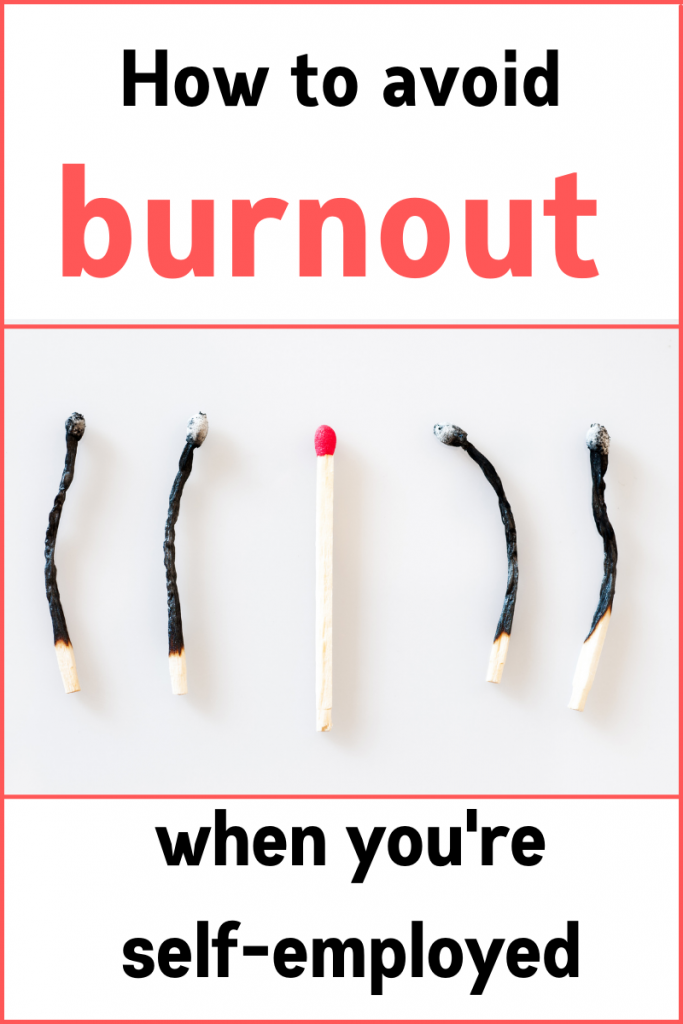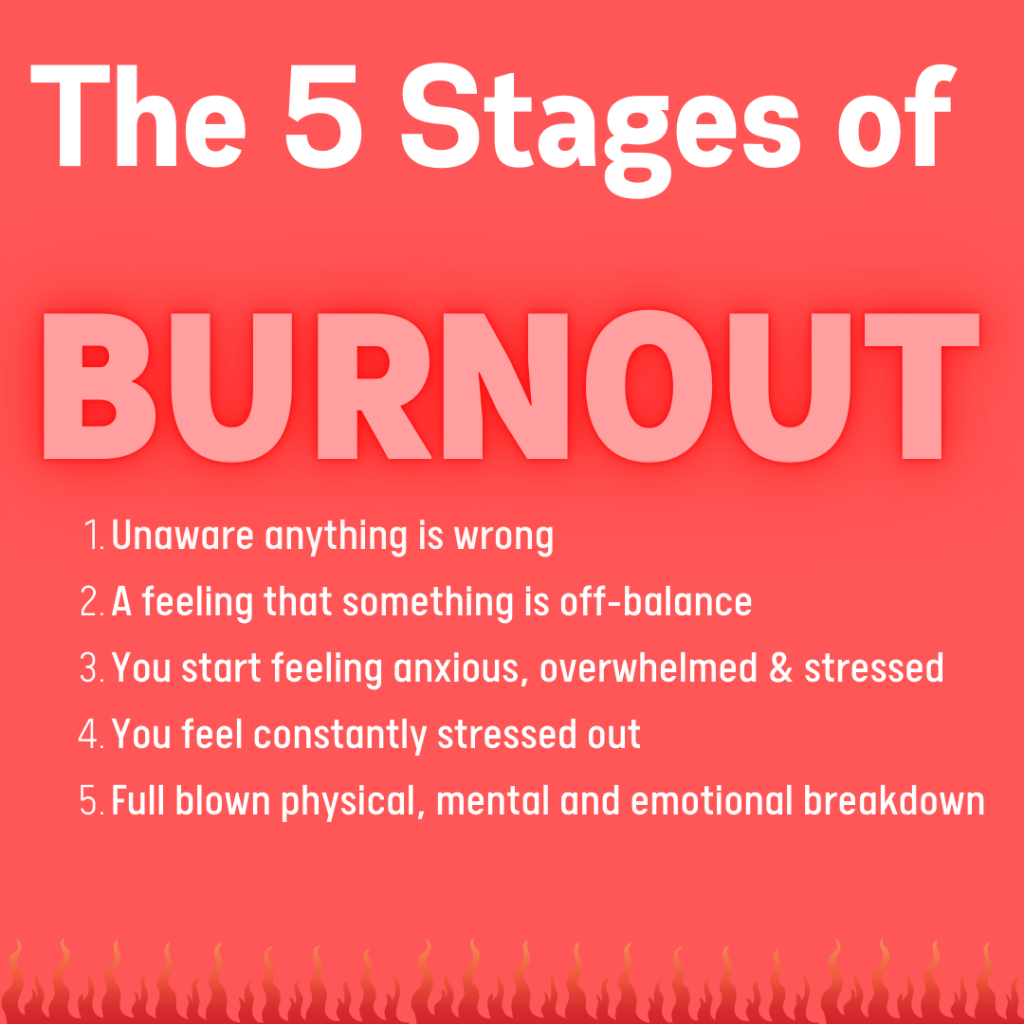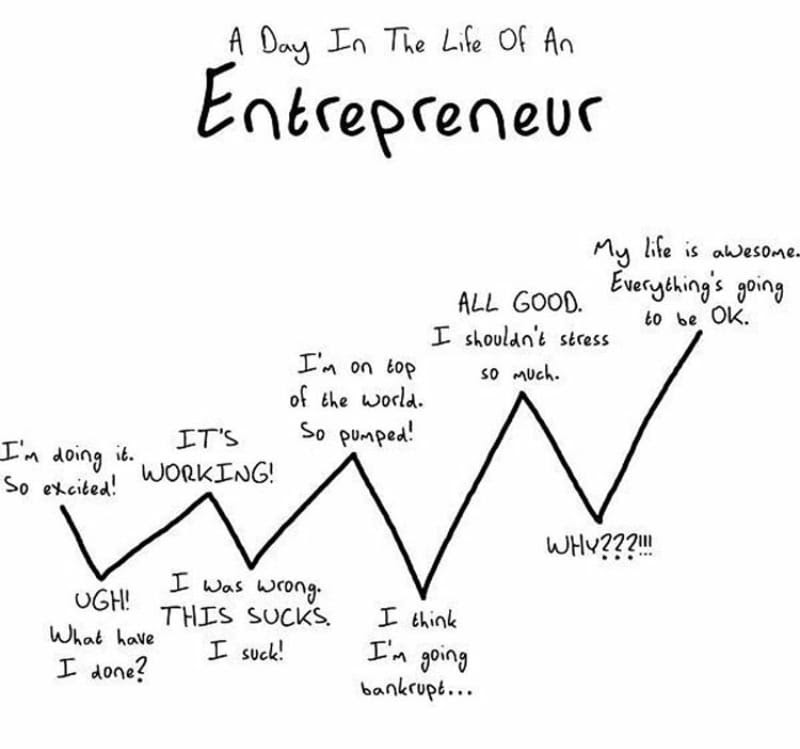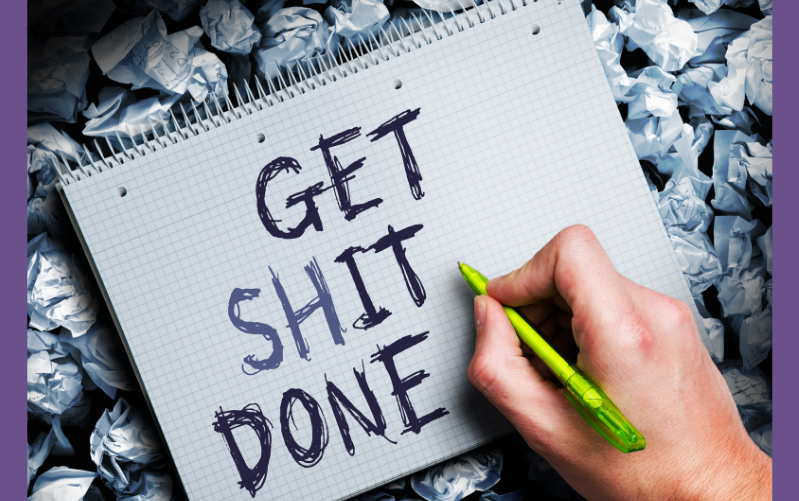Burnout is a very real and frightening prospect when you’re self-employed. As someone who struggles with various mental health issues and is often running on empty, I wanted to dig a bit deeper and find out exactly what is meant by burnout and how self-employed, freelancers and entrepreneurs can manage their stress levels and avoid burnout.

A survey carried out on entrepreneurs by The Harvard Business Review in 2018 found out that all entrepreneurs experience some level of burnout at one point or another. Some feel it more than others, with 25% of respondents reporting to be moderately burned out.
Arianna Huffington experienced the ultimate burnout a couple of years after launching the Huffington Post media empire. She was so exhausted and running on empty that she passed out on the bathroom floor of her home after being swamped with work and putting in ridiculous hours.
So, what exactly is burnout?
The term burnout was coined by the psychologist, Herbert Freudenberger in the 1970s & describes a severe stress condition that leads to severe physical, mental, and emotional exhaustion.

Burnout is extremely debilitating and unlike ordinary fatigue makes it challenging for people to cope with stress and manage day-to-day responsibilities.
People experiencing burnout often feel like they have nothing left to give and may dread getting out of bed each morning. They may even adopt a pessimistic outlook toward life and feel hopeless.
Burnout doesn’t go away on its own and, if left untreated, it can lead to serious physical and psychological illnesses like depression, heart disease, and diabetes.
What are the commons signs of burnout?
Watch out for the following signs include:
- Tiredness or drained most of the time
- Helpless, trapped and/or defeated
- Feeling detached/alone in the world
- Having a cynical/negative outlook
- Self-doubt
- Procrastinating and taking longer to get things done
- Feeling overwhelmed
Why are self-employed more prone?

Trying to deal with the stress and uncertainty of being self-employed isn’t easy and Covid-19 has really taken its toll on our mental health. Most often, trading passion for long working hours and often trying to do everything yourself (some of us just can’t delegate!) makes self-employed people, especially entrepreneurs the most at-risk group for burnout.
If you’re spending every minute of the day and night working on your business, eventually it will lead to burnout. Probably the biggest warning sign that you are experiencing burnout is when you become totally obsessed with work and ignore other parts of your life such as family and friends, you’re no longer interested in your hobbies and cancel social arrangements. If that sounds like you, then you need to do something about it NOW!
Here are some of the reasons self-employed are more prone to burnout:
Pressure to earn the dough – your income relies directly on the work you do. The more you work the more you earn. The less you work, the less you earn. This puts a great deal of pressure on you!
You wear all the hats – being self-employed means that you are often juggling and multi-tasking to get everything done. You have the pressure of having to find clients, do the actual work, invoice them (often chase up the invoices!), answer the phone, do your admin, bookkeeping etc.
No support team – unlike an employee, you don’t have colleagues, an HR department or access to fancy wellness schemes that you can turn to.
Boundaries between work and home life blurred – being self-employed often means that you are always connected and never properly switch off. I am often checking emails and replying late at night which isn’t good for your mental health.
Is it linked to personality type?
Some people are more prone to burnout than others. Personality plays a role in the risk of burnout and you’re more likely to be prone to burnout if you’re one of the four personality types listed below:
- Type A Personality –they tend to be perfectionists and workaholics so burnout can come from emotional exhaustion – one day they just can’t do it anymore Or, it can come from the constant elevated level of oxidative stress that their body is kept in
- People Pleaser – burnout and fatigue are hallmark features of people-pleasing. These are a natural consequence to overgiving and putting others before their own needs.
- Emotionally Dissonant –people who are constantly forcing themselves to put on a happy face even when that’s not how they’re actually feeling causes stress and over time leads to burnout.
- Emotionally Unaware- this type of person is at greater risk of burnout simply from a lack of awareness of their own state of being.
How burnout alters the brain
Neuroscientists have discovered that burnout alters the brain and has the following effects:
- It enlarges your amygdala– the part of the brain that controls emotional reactions. This can increase moodiness. It also causes you to have a stronger stress response when startled.
- Burnout causes the prefrontal cortex – the part of the brain that is responsible for cognitive functioning – to thin. This happens normally with ageing but in people who are stressed for prolonged periods of time, it occurs much more rapidly.
- Parts of the brain that control memory and attention spans are weakened. This makes it more difficult to learn.
- The brains of people who are chronically burnt-out show similar damage as people who have experienced trauma.
- Burnout reduces the connectivity between various parts of the brain which can lead to decreased creativity, working memory and problem- solving skills.
Mindset shifts to avoid burning out
A growth mindset can help you avoid burnout and I have included a growth mindset worksheet in ‘my little mental health first aid kit’ (details at the end of this blog post). Here are three mindset shifts that will help you avoid burnout:
- Don’t be the source of your stress – resist your perfectionist tendencies and your drive for constant high achievement. Recognize when you’re being too hard on yourself, and let go.
- Recognize your limitations – don’t try to be a hero. If you don’t have the ability or bandwidth to do something, be honest with yourself and ask for help.
- Reevaluate your perspective – do you view a particular situation as a threat to something you value? Or do you view it as a problem to be solved? Change how you see the situation to bring your stress levels down.
Top 10 tips to avoid burnout at work
- Self-care – take time out during the day to practice self-care, unwind and de-stress. Listening to music, having a nap, going for a run or meeting a friend for coffee will not only help you feel better but also supercharge your productivity. Getting adequate sleep and eating a balanced diet including foods that boost your serotonin level (like dark chocolate!) will also help you manage stress better. Taking regular time off is also important for your wellbeing. It helps you to keep your stress under control and to live in the moment. When you make yourself available to your work 24/7, you expose yourself to a constant barrage of stressors and burnout is inevitable. Treat yourself to the occasional bar of dark chocolate can actually boost serotonin levels (a happiness chemical in your body).
- It’s ok to say no – be realistic about how much work you can cope with and say no to clients if you have reached capacity. Research conducted at the University of California, San Francisco, shows that the more difficulty that you have saying no, the more likely you are to experience stress, burnout, anxiety, and depression. And if you have toxic clients let them go!
- Delegate – outsource your admin to a VA so you can work on your business not in it plus they will save you time and stress!
- Give clients clear project briefs – always provide clear briefs so you and the client know exactly what you will and won’t do for the fee you are charging. This will save you time and stress!
- Systemise your business to save time – putting systems in place and automating your business will save you so much time and hassle.
- Stick to a regular routine – a healthy work-life balance is important and you can achieve this by getting into the habit of having set work hours. Once you’ve done your set hours then it’s time to switch off until the next day. Try switching your ‘Out of Office’ email notification on!
- Build resilience – resilience is what gives people the psychological strength to cope with stress and hardship & building resilience will help you avoid burnout.
- Practice meditation &/ or mindfulness- Studies show meditation and mindfulness can reduce anxiety, alleviate feelings of depression, and calm the nervous system.
- Turn off your screens – too much tech overloads our systems and causes stress. Turn off your laptop and phone then go and do something else for an hour or so! Staring at a screen all day is bad for your mental health as well as your eyesight!
- Try working somewhere different – co-working spaces help reduce the isolation and loneliness experienced by self-employed and freelancers. Even working from the local coffee shop once in a while will stop you stagnating and supercharge your creativity.
There is a great interview you can check out with Leapers Founder, Matthew Knight, about burnout .
My Little Mental Health First Aid Kit
Finally, grab a copy of ‘My Little Mental Health First Aid Kit’ which I’ve written to help freelancers and self-employed manage their stress levels and avoid burnout, overcome Imposter Syndrome, retrain their brains to think more positively, develop a ‘growth’ mindset, boost their resilience plus much more.

